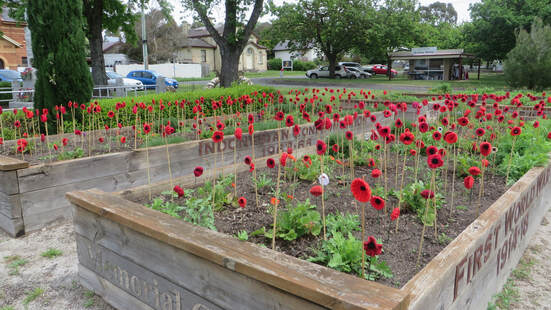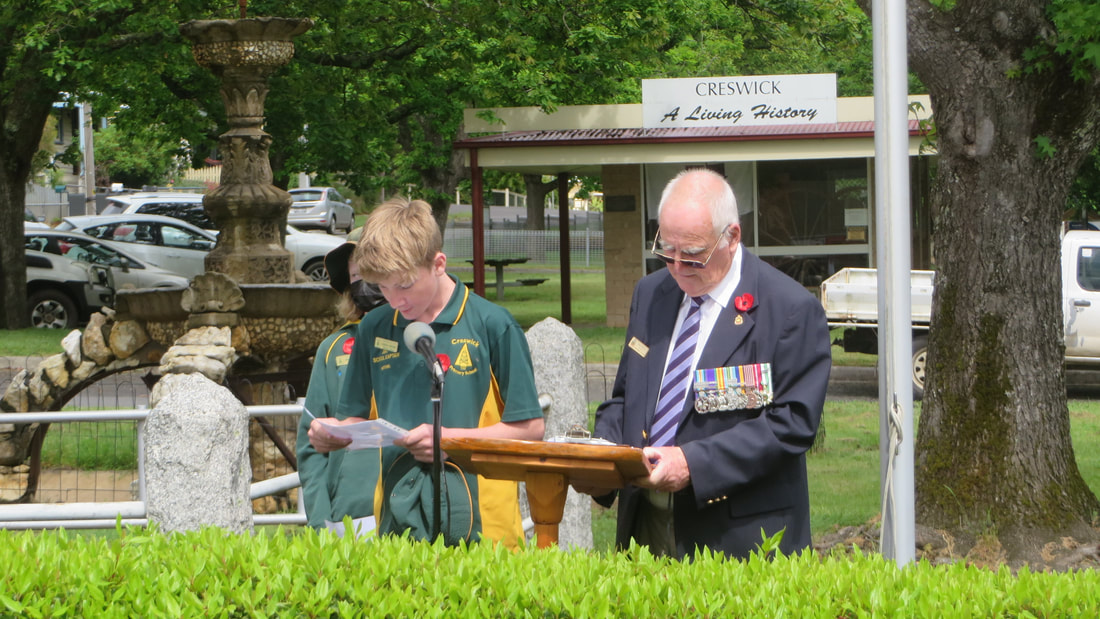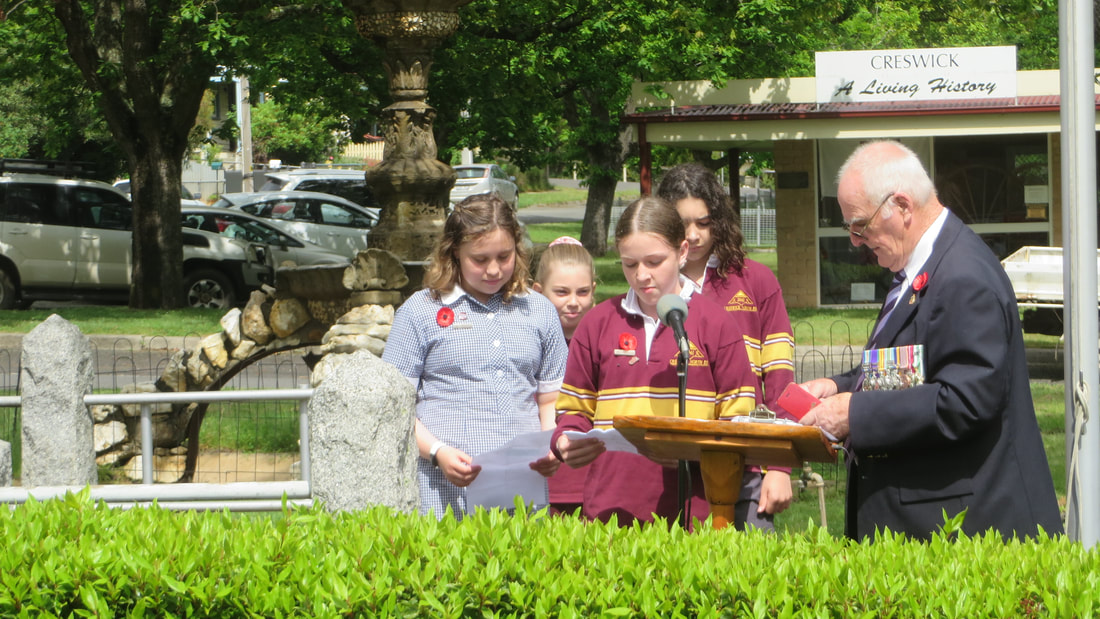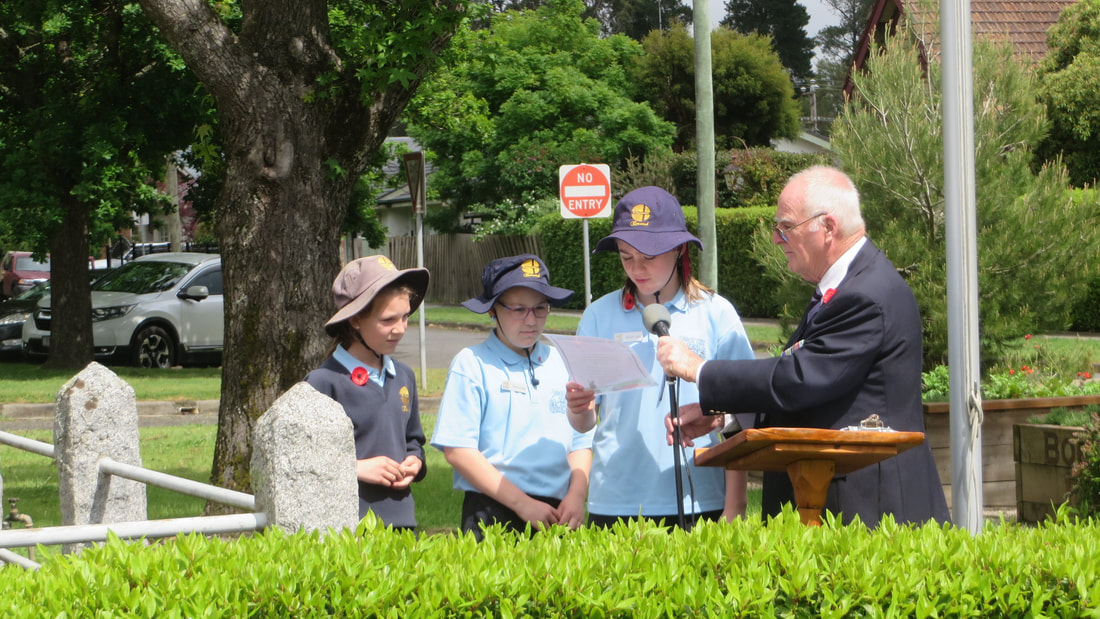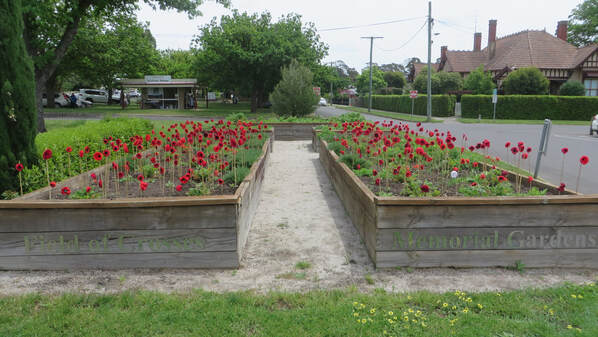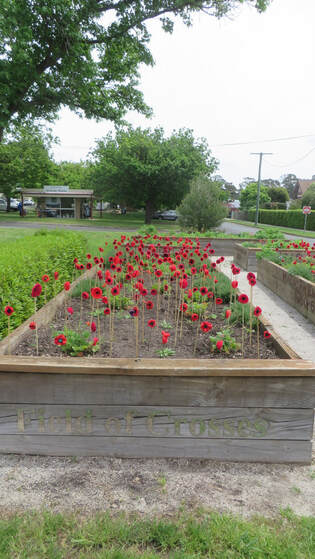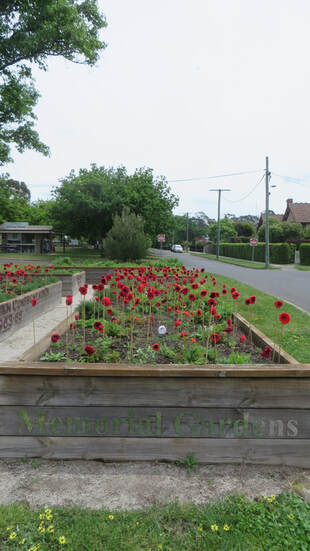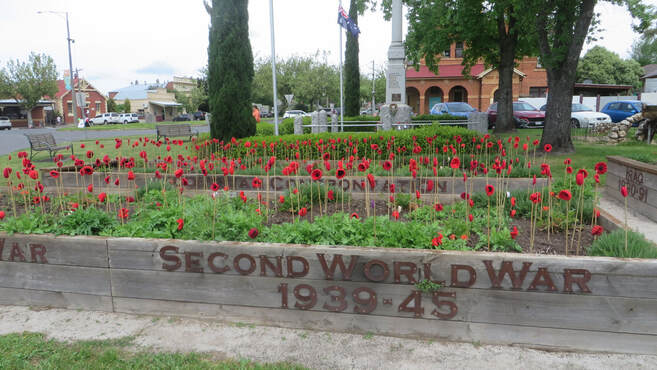Remembrance Day 2022
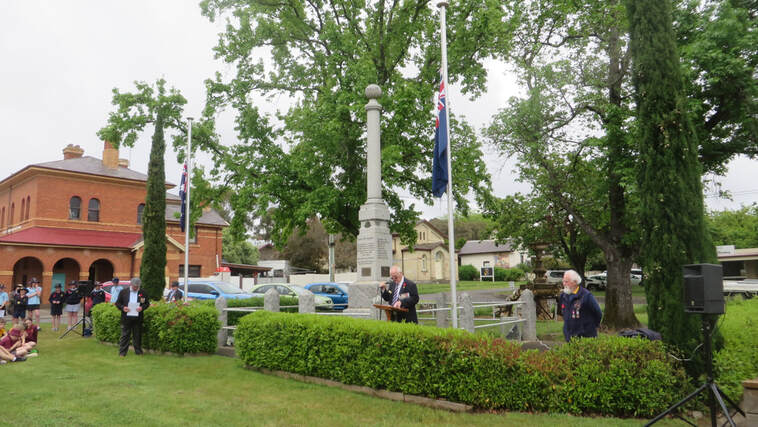
Good Morning
We would like to acknowledge we are meeting on Jaara people country, of which members and elders of the Dja Dja Wurrung community and their forebears have been custodians for many centuries.
On this land, the Jaara people have performed age old ceremonies of celebration, initiation and renewal.
We acknowledge their living culture and their unique role in the life of this region.
World War I began in 1914 and lasted for four years. More than 60000 Australians were killed, many more were wounded and many more suffered for the rest of their lives.
At 5am on 11 November 1918, the German government representatives accepted the Armistice terms presented to them by the allies.
The armistice became effective at 11am the same day, and as the guns fell silent on the Western Front in France and Belgium, four years of hostilities ended.
In Australia and the other allied countries, 11th November became known as Armistice Day, a day to remember those who died in World War 1.
After World War II the Australian Government agreed to the United Kingdom's proposal that Armistice Day be renamed Remembrance Day to commemorate those who were killed in both World Wars.
Today the loss of all lives from all wars and conflicts is commemorated on Remembrance Day in Australia and the other commonwealth countries.
Remembrance Day is not a day for parades or to celebrate a victory. It is a day to remember all those brave servicemen and women who gave their lives in the defence of our nation. It is also a day to remember all those ex servicemen and women who returned from hostilities only to suffer with physical or mental injuries received as a result of those hostilities, and to remember the many ex servicemen and women who today are homeless as a result of their service and who have to live in substandard conditions. Remembrance day is just another day. We should be remembering all these people for every day of every year, for without their service we would not be enjoying the conditions that we enjoy in this great country of ours.
As a mark of respect to those who have died and suffered, we will be observing one minute’s silence at 1100 to reflect on the loss and suffering caused by war.
Today we honour another local hero
Lieutenant John Harris
John was born in Creswick and was working as a hairdresser when he applied to enlist on 11th March 1915 and took the Oath on 15th March.
He enlisted at Creswick on 28th April in ‘B’ Company, 24th Battalion having had previous experience as a Lieutenant in Senior Cadets, for 3½ years.
He was posted to 24th Battalion, Broadmeadows, on 28th April and promoted to Sergeant on 23rd June.
John then proceeded to join the British Expeditionary Force on Gallipoli Peninsula on 30th August 1915.
He sailed from Mudros & disembarked at Alexandria on 1st January 1916 and then on to Marseilles arriving there on 26th March.
He was promoted to Warrant Officer, Class 1. on 1st April and then to 2nd Lieutenant on 12th August.
He was wounded in action on 26th August and taken to 4th Australian Field Ambulance with gunshot wound to his left arm. He re-joined his Battalion on 30th August.
He was promoted to Lieutenant on 12th November.
John was admitted to Casualty Clearing Station on 14th February having been diagnosed with scabies. He was transferred by ambulance train to Rouen on 19th February and admitted to No. 8 General Hospital, Rouen. He was discharged to Base Depot on 8th March.
He resumed duties from seconded list & re-joined the 24th Battalion on 18th March.
John was wounded in action & reported missing on 3rd May and later reported killed in action in the field.
It was recorded that “Lieutenant J. Harris was killed by enemy shell-fire whilst leading his platoon to the 3rd Obstacle in the Attack on the Hindenburg Line near Bullecourt on 3rd May 1917. The body of this officer was not buried as he was in a position too advanced to permit recovery”.
His mother - Mrs. Margaret Harris of Albert Street, Creswick, was granted a pension of 30/- per fortnight from 19th July 1917. His father (James) received a Memorial Scroll in 1921 & Plaque in 1922.
MEDALS RECEIVED – 1914-15 Star, British War Medal, Victory Medal
We would like to acknowledge we are meeting on Jaara people country, of which members and elders of the Dja Dja Wurrung community and their forebears have been custodians for many centuries.
On this land, the Jaara people have performed age old ceremonies of celebration, initiation and renewal.
We acknowledge their living culture and their unique role in the life of this region.
World War I began in 1914 and lasted for four years. More than 60000 Australians were killed, many more were wounded and many more suffered for the rest of their lives.
At 5am on 11 November 1918, the German government representatives accepted the Armistice terms presented to them by the allies.
The armistice became effective at 11am the same day, and as the guns fell silent on the Western Front in France and Belgium, four years of hostilities ended.
In Australia and the other allied countries, 11th November became known as Armistice Day, a day to remember those who died in World War 1.
After World War II the Australian Government agreed to the United Kingdom's proposal that Armistice Day be renamed Remembrance Day to commemorate those who were killed in both World Wars.
Today the loss of all lives from all wars and conflicts is commemorated on Remembrance Day in Australia and the other commonwealth countries.
Remembrance Day is not a day for parades or to celebrate a victory. It is a day to remember all those brave servicemen and women who gave their lives in the defence of our nation. It is also a day to remember all those ex servicemen and women who returned from hostilities only to suffer with physical or mental injuries received as a result of those hostilities, and to remember the many ex servicemen and women who today are homeless as a result of their service and who have to live in substandard conditions. Remembrance day is just another day. We should be remembering all these people for every day of every year, for without their service we would not be enjoying the conditions that we enjoy in this great country of ours.
As a mark of respect to those who have died and suffered, we will be observing one minute’s silence at 1100 to reflect on the loss and suffering caused by war.
Today we honour another local hero
Lieutenant John Harris
John was born in Creswick and was working as a hairdresser when he applied to enlist on 11th March 1915 and took the Oath on 15th March.
He enlisted at Creswick on 28th April in ‘B’ Company, 24th Battalion having had previous experience as a Lieutenant in Senior Cadets, for 3½ years.
He was posted to 24th Battalion, Broadmeadows, on 28th April and promoted to Sergeant on 23rd June.
John then proceeded to join the British Expeditionary Force on Gallipoli Peninsula on 30th August 1915.
He sailed from Mudros & disembarked at Alexandria on 1st January 1916 and then on to Marseilles arriving there on 26th March.
He was promoted to Warrant Officer, Class 1. on 1st April and then to 2nd Lieutenant on 12th August.
He was wounded in action on 26th August and taken to 4th Australian Field Ambulance with gunshot wound to his left arm. He re-joined his Battalion on 30th August.
He was promoted to Lieutenant on 12th November.
John was admitted to Casualty Clearing Station on 14th February having been diagnosed with scabies. He was transferred by ambulance train to Rouen on 19th February and admitted to No. 8 General Hospital, Rouen. He was discharged to Base Depot on 8th March.
He resumed duties from seconded list & re-joined the 24th Battalion on 18th March.
John was wounded in action & reported missing on 3rd May and later reported killed in action in the field.
It was recorded that “Lieutenant J. Harris was killed by enemy shell-fire whilst leading his platoon to the 3rd Obstacle in the Attack on the Hindenburg Line near Bullecourt on 3rd May 1917. The body of this officer was not buried as he was in a position too advanced to permit recovery”.
His mother - Mrs. Margaret Harris of Albert Street, Creswick, was granted a pension of 30/- per fortnight from 19th July 1917. His father (James) received a Memorial Scroll in 1921 & Plaque in 1922.
MEDALS RECEIVED – 1914-15 Star, British War Medal, Victory Medal
Reading of poems by students from Creswick Primary, Creswick North Primary and St Augustines PS
|
Creswick Primary School.
I went to see the soldiers by Kenny Martin I went to see the soldiers, row on row on row, And wondered about each so still, their badges all on show. What brought them here, what life before Was like for each of them? What made them angry, laugh, or cry, These soldiers, boys and men. Some so young, some older still, a bond more close than brothers These men have earned and shared a love, that's not like any others They trained as one, they fought as one They shared their last together That bond endures, that love is true And will be, now and ever. I could not know, how could I guess, what choices each had made, Of how they came to soldiering, what part each one had played? But here they are and here they'll stay, Each one silent and in place, Their headstones line up row on row They guard this hallowed place. |
Creswick North Primary School
My Thoughts on Remembrance Day By Cody Lynch, © 2007 On the eleventh day of the eleventh month We pause at the eleventh hour Some of us stop to pray For soldiers who died or went missing along the way. Lest we forget the wars that were fought To give us freedom So many were shot. I will always remember My great Grandpa who died Rest in peace dear Grandpa You are always on my mind. I would love to join the military someday To give back to my country And to make my world a better place. Rest in peace all you soldiers Who gave up your lives For people like me It's a shame that you died. |
St Augustine's Primary School
In Flanders fields. John McCrae (1872–1918) In Flanders fields the poppies blow Between the crosses, row on row, That mark our place: and in the sky The larks, still bravely singing, fly Scarce heard amid the guns below. We are the Dead. Short days ago We lived, felt dawn, saw sunset glow, Loved and were loved, and now we lie In Flanders fields. Take up our quarrel with the foe: To you from failing hands we throw The torch; be yours to hold it high. If ye break faith with us who die We shall not sleep, though poppies grow |
Would all who wish to lay a wreath please come forward
Hepburn Shire
Creswick-Smeaton RSL
Catherine King
Louise Staley
Australian Red Cross
Legacy Club
Creswick Senior Citizens
Creswick Historical Society
Creswick Neighbourhood Centre
Creswick IGA
Creswick CFA
Creswick Band
Creswick Lions
Creswick Primary School
North Creswick Primary School
St Augustine's Primary School
The Ode
Last Post
Minute Silence
Rouse
Advance Australia Fair
That concludes our service for today.
Last Post
Minute Silence
Rouse
Advance Australia Fair
That concludes our service for today.
Poppy Display
Each year the Council gardeners plant poppy seed for poppies for Remembrance Day. Unfortunately due to the weather conditions, this years poppies have not geminated.
The RSL put out a request to the community asking if any one has any handmade poppies they wish to donate or would like to make poppies for displaying in the Field of Crosses Memorial Gardens and were able to be dropped off at the Creswick Hub in the box provided.
The Creswick-Smeaton RSL appreciated the assistance that members of community made with the making of nearly 400 poppies for this years display.
Each year the Council gardeners plant poppy seed for poppies for Remembrance Day. Unfortunately due to the weather conditions, this years poppies have not geminated.
The RSL put out a request to the community asking if any one has any handmade poppies they wish to donate or would like to make poppies for displaying in the Field of Crosses Memorial Gardens and were able to be dropped off at the Creswick Hub in the box provided.
The Creswick-Smeaton RSL appreciated the assistance that members of community made with the making of nearly 400 poppies for this years display.
